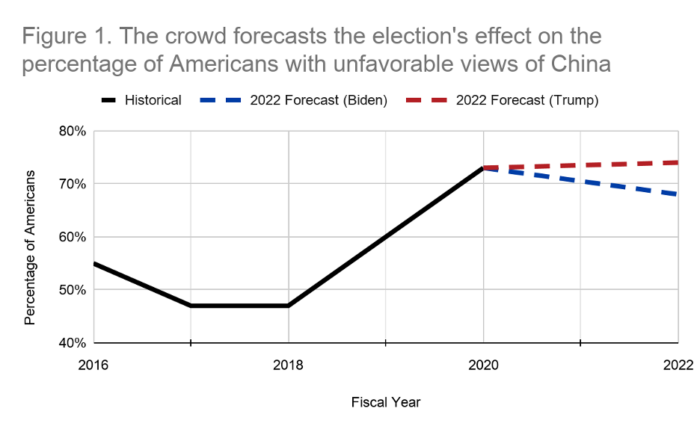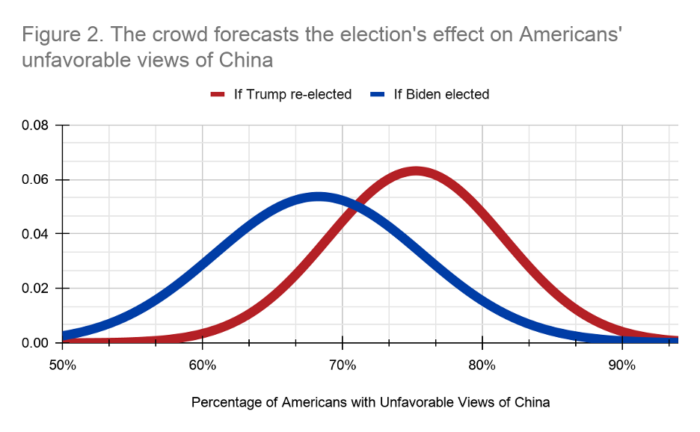Elections reflect public views, but they might also shape them. The crowd expects that more Americans will have an unfavorable view of China in 2022 if President Trump is re-elected than if Vice President Biden is elected. American opinion of China is one of three metrics we asked the crowd to forecast, conditional on the outcome of the U.S. presidential election.
According to the Pew Global Attitudes Survey, Americans’ unfavorable views of China are at an all-time high.1 Between 2005 and 2018, the percentage of Americans who viewed China unfavorably hovered between 40 and 47 percent. Since 2018, however, that number has risen to 73 percent. We asked the crowd to forecast American opinion of China in 2021 and 2022.2 For 2022, we asked respondents to make their forecast conditional on whether President Trump is re-elected or Vice President Biden is elected.

The crowd expects Americans’ unfavorability toward China to remain constant through 2021, at about 73 percent. For 2021, we did not ask the crowd to provide different forecasts based on the election outcome. As shown in Figure 1, for 2022, the crowd forecasts that if President Trump is re-elected, the percentage of Americans with an unfavorable view of China will increase to 74 percent. By contrast, if Vice President Biden is elected, the crowd expects that percentage to decline to 68 percent.

American opinion of China is one of many metrics we are forecasting on Foretell to track U.S.-China tensions.3 We also asked the crowd to forecast the percentage of O visas going to Chinese nationals, conditional on the election results. As discussed in a recent blog post, the crowd forecasts a significantly smaller percentage of O visas will go to Chinese nationals if President Trump is re-elected.
To help gauge the relationship between the U.S. government and the tech industry, we are also forecasting the likelihood that the next presidential administration brings an antitrust action against any of Amazon, Facebook, or Apple. The crowd currently believes an antitrust action is likely regardless of the election’s outcome, but is more likely (67 percent) if President Trump is re-elected than if Vice-President Biden is elected (60 percent). Table 1 summarizes these three sets of election-conditional forecast questions.
Table 1. Election-Conditional Forecast Questions on Foretell
| Metric | Predictor | Election’s Effect |
| Public unfavorability toward China | U.S.-China tensions | Higher unfavorabiity—meaning higher U.S.-China tensions—if President Trump is re-elected (74%) than if Vice-President Biden is elected (68%) |
| Percentage of O visas to Chinese nationals | U.S.-China tensions | Lower percentage—meaning higher U.S.-China tensions—if President Trump is re-elected (3.5%) than if Vice-President Biden is elected (5.5%) |
| Big-tech antitrust lawsuit in next presidential term | DoD-tech industry tensions | More likely—meaning higher DoD-tech industry tensions—if President Trump is re-elected (67%) than if Vice-President Biden is elected (60%) |
If you have suggestions for other conditions on which to base forecast questions, please send them to cset-foretell@georgetown.edu. To forecast questions such as these, register as a forecaster at cset-foretell.com.
- Pew uses random sampling of landline and cellphone numbers in the United States to identify survey respondents. You can read more about its sampling methodology here.
- Pew conducts its U.S. Global Attitudes Survey at irregular intervals. The forecast questions resolve based on the results of a survey that begins sometime between February 1 and June 30 of the target year. If no survey begins during that period, this question will not be scored.
- To learn more about how Foretell uses forecast questions as metrics to inform big picture scenarios, see our recent issue brief, “Future Indices: How Crowd Forecasting Can Inform the Big Picture.”